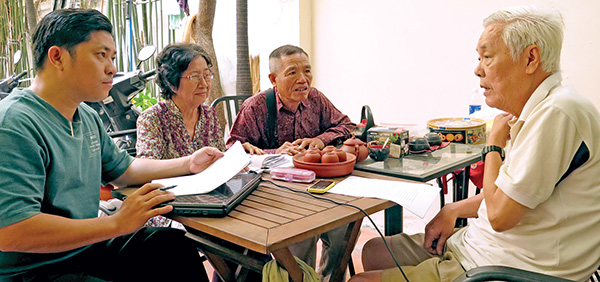A group of Vietnamese researchers have dedicated themselves to compiling family trees and lineage records for local households in an attempt to help them keep track of their origins and pay homage to their ancestry.
For the past 16 years, at a house in District 1, Ho Chi Minh City, around 30 historians from the Ho Chi Minh City Lineage Record Research and Practice Center have been tirelessly pooling over 100 lineage records and numerous archives and biographies, as well as instilling fervor in younger generations.
The members worked independently under the guidance of local experts for several years before the center’s foundation in 2005.
The team has also provided counseling in setting up lineage shrines, compiled annals for historic temples and venues, organized training courses, and published books on how to build lineage records.
Vo Ngoc An, deputy head of the Lineage History Institute and the center’s director, explained to Tuoi Tre (Youth) newspaper what he and his associates do.

Vo Ngoc An, deputy head of the Lineage History Institute and director of the Ho Chi Minh City Lineage Record Research and Practice Center. Photo: Tuoi Tre
Only one percent of Vietnamese own lineage records
An noted that since Vietnamese people’s financial and education conditions have seen remarkable strides over the last half a century, people are paying considerably more attention to the systemized compilation of their origins into lineage records.
Many think lineage record compilation has several benefits, including reminding them of their forefathers’ dates of birth and death, and distant relatives’ names to avoid coincidental renaming, as well as providing them with a tangible source of pride in their ancestry, he observed.
“The lineage records are also of tremendous help to us in compiling history textbooks. My institute’s research revealed a mere one percent of Vietnamese people own lineage records, including recent additions. The number is insubstantial indeed,” An stressed.
The veteran researcher added that in wartime, many members of lineages and extended families were on opposite sides.
Compiling lineage records thus also helps family members bury the hatchet and sit down together in harmony.
Recently a number of former and current Vietnamese political leaders, including State President Truong Tan Sang, have also solicited the center’s help in compiling their lineage records.
“That is indicative of the hearty embrace our job has received. The leaders are just like average people, who all yearn for the quest and systemized compilation of their ancestral origins,” An explained.

A page from a lineage record book prepared for the Chau lineage who resides in the Mekong Delta province of Ca Mau. Photo: Tuoi Tre
Around 151 other people have also placed orders with his center.
“I think most people yearn to give tangible form to their ancestral origins, but they could not afford to do so, as in the past lineage records were exclusive to royalty, the literati and the elite. In addition, there were times when Vietnam frowned on lineage record compilation as an attempt to revive feudalism,” An elaborated.
The researcher noted that with limited archival resources and researcher involvement in the job, family trees and related information were mostly retained in lineage members’ memory, or steles, graves and administrative paperwork at best.
An added that people have adopted several different methods to systemize their ancestral origins in recent years.
For instance, Ho Chi Minh City is currently home to 356 lineages.
Among them, between 30 and 35 lineages have fellowmen centers, who also wish to set up their own lineage records.

A lineage record book of the Ngo family. Photo: Tuoi Tre
Young generations’ budding interest
An said young people, particularly university majors in culture and social sciences, have recently developed a growing interest in what he and his associates have been doing.
They also keep in regular contact with An’s team to put theory into practice and hone their skills in building lineage records.
A number of female students shared they used to have little interest in their own lineage’s records as women are traditionally believed not to be involved in such things.
Inspired by An’s and his partners’ work, the young women have embarked on studying and building their lineage’s records.
“Youths now are really quick to learn and eager to try new approaches. Several young members at our center go on field trips and take the initiative,” An added.
Among the currently available approaches to building lineage records, An and his team have opted to take field trips and garner evidence from witnesses.
“We’ve gathered priceless historical evidence through field trips and from witnesses and contemporaries which have complimented historical archives. The new findings shed clearer light on historical events and figures, and in some cases even help clear their names,” he pointed out.
An said he pays special attention to online lineage records, which have proliferated in today’s Internet boom.
He found online lineage records, which are usually built by young people, the easiest way to set up records and show photos and video clips as well.
“Unlike Western lineage record websites, where records begin from themselves and can be traced back to their ancestors, Vietnamese records go vertically down from ancestors to offspring. We are willing to adopt foreign technology but are adamant in retaining the Vietnamese lineage record hierarchy,” he added.
An said his center is willing to provide free consultancy for those who wish to build their lineage records on a limited budget.
Like us on Facebook or follow us on Twitter to get the latest news about Vietnam!




















































